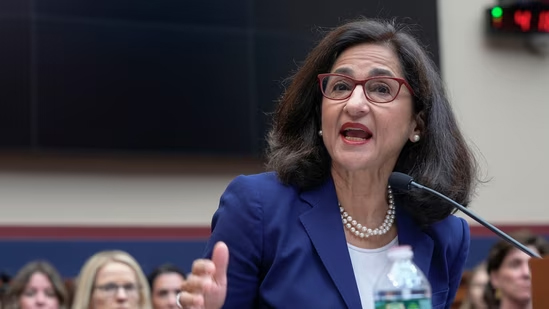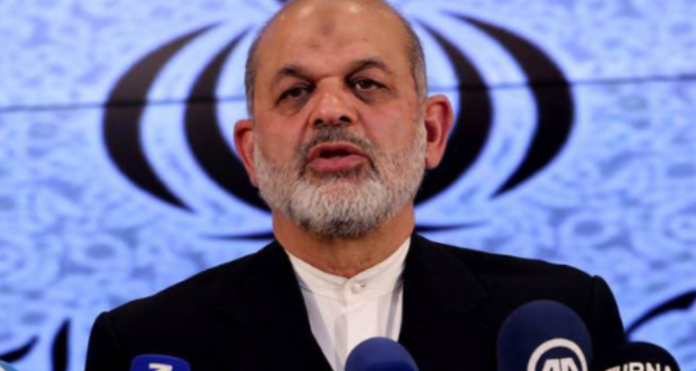By Hugh Fitzgerald, Frontpage Magazine
Details on Columbia University’s descent into pure racist hatred be found here: “‘Burn Tel Aviv to the ground:’ Calls for violence continue at Columbia,” by Michael Starr, Jerusalem Post, April 21, 2024:
In another Instagram video, in which a poster of Popular Front for the Liberation of Palestine secretary-general Ahmad Sa’adat can be seen in the background, anti-Israel activists sang, “Oh Hamas, our beloved, strike, strike Tel Aviv.”
These students on Instagram display a PFLP official on a poster in the background, while they sing about a different terror group, Hamas, calling on its operatives to engage in a genocidal attack on Tel Aviv: “Oh Hamas, our beloved, strike, strike Tel Aviv.”
Either they couldn’t find a Hamas poster to use or, more likely, they can’t tell the difference between Hamas and the PFLP.
As the counter-protesters returned to their dormitories, Students Supporting Israel Columbia video showed that they were taunted with calls of “Jews” and told to “go back to Poland.”
The word “Jew” is now considered, in the antisemitic atmosphere in which we now live, an insult.
And note the constant insinuation that Jews in America don’t belong, that they must leave and “go back to Poland” or “go back to Europe.”
Jews don’t belong here, and they don’t belong in “Palestine.”
So let them go to some place in eastern Europe with their bagels and lox, and leave us, real Americans such as Ilhan Omar and Rashida Tlaib and Professor Joseph Massad, alone.
Oh, we almost forget — there is always the Jewish Republic of Birobidzhan, in the godforsaken middle of Siberia.
Just the place for Jews to settle, and read their Talmud undisturbed.
One Jewish counter-protester tried to stop the activists from setting an Israeli flag on fire, according to SSI. In another video, a Jewish student was splashed with water.
Within Our Lifetime leader Nerdeen Kiswani, after her wedding, managed to enter the campus despite it being allegedly locked down.
Kiswani led the crowd in a chant in a video published by Students for Justice in Palestine Columbia, saying “There is only one solution, Intifada revolution.”
In a video published by Palestinian Youth Movement NYC, they chanted, “Zionism will fall, brick by brick, wall by wall, Israel will fall” and called “US imperialists, number one terrorists.”
Uptown 4 Palestine published videos of activists proclaiming in Arabic that “From the water to the water (a reference to the Jordan River and the Mediterranean Sea), Palestine is Arab.” (The chant is an alternate version of the chant “From the river to the sea, Palestine will be free”)
As of now, Zionism will not “fall.” Israel goes from strength to strength.
The Start-Up nation continues to produce unicorns, as Israeli scientists and entrepreneurs make advances in cybersecurity, solar energy, electric batteries, anti-missile defense systems, medicines and medial equipment, and much more.
Israelis have more companies listed on our Stock Exchange than any other foreign country except China.
Jews from Europe are making aliyah in ever-increasing numbers, undeterred by the current violence.
Israel’s military is ranked as the fourth most powerful, in the world, after those of the United States, Russia, and China, and ahead of the UK, France, and Germany.
It has made startling advances in military hardware, including the anti-missile defense systems David’s Sling, Iron Dome and, to be introduced into service next year, Iron Beam, a laser-based system that will cost only $2 for each lethal laser hit.
And despite having had to fight, in its young life, four wars for its very survival (in 1948, 1967, 1973, and 2023-24), and many smaller campaigns against terror groups, including the PLO, Hamas, PIJ, PFLP, and Hezbollah, Israel has been ranked as the “fourth happiest nation,” after three Scandinavian countries, Finland, Sweden, and Denmark.
Quite a list of achievements for such a young, small country with hardly any natural resources, that is surrounded by enemies.
What will the next 75 years bring?
Those protesters at Columbia, UNC-Chapel Hill, Berkeley, Harvard, Rutgers, and a hundred sundry other colleges, will yip and yap, and issue their bloodcurdling threats about burning down Tel Aviv and removing Jews from America, but they have had no discernible effect except, one hopes, to get themselves expelled from the schools that heretofore have coddled them.
As for the IDF, it must now finish the dismantling of Hamas, by attacking its four last intact battalions in Rafah.
Once that is accomplished, it must then proceed to destroy Hezbollah’s stockpiles of rockets and missiles in Lebanon.
The last, and most important task, for the IDF is to destroy Iranian nuclear facilities so that there is no chance that Iran will be able to build a nuclear weapon.
It’s a formidable To-Do List, but when has Israel ever failed at the tasks it sets itself?
















